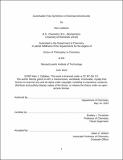Automated Flow Synthesis of Biomacromolecules
Author(s)
Callahan, Alex
DownloadThesis PDF (19.93Mb)
Advisor
Pentelute, Bradley L.
Terms of use
Metadata
Show full item recordAbstract
Chemically synthesized biomacromolecules are powerful tools that enable modern biological study, but certain classes remain under-investigated. Existing techniques to access phosphorodiamidate morpholino oligomers (PMOs), mirror image proteins (D proteins), and peptide nucleic acids (PNAs) are functional but require individualized attention and time-intensive effort. As a result, unlike easily accessible biopolymer classes, widespread application of PMOs, D proteins, and PNAs in biotechnological workflows remains rare.
In this work, we report the development of strategies for rapid, reliable access to these synthetically challenging classes of biomacromolecules. Existing synthetic pipelines face two primary complications: long timelines and unpredictable synthetic inefficiency. These issues arise from chemical properties inherent to the biopolymer backbone, for example, sequence-dependent aggregation of proteins and rapid side reactions of PNAs. This thesis reports the development of new production pipelines that address these issues with improvements to chemical synthesis techniques and purification and handling workflows.
Generalized production pipelines were developed for PMOs, proteins, and PNAs. We demonstrate the rapid synthesis of PMOs with a custom-designed automated fast-flow instrument. With this instrument, chemical and process variables of PMO synthesis were optimized, resulting in a platform that enables same-day PMO synthesis. No longer limited by week-long lead times, we demonstrated the on-demand perpetration of PMOs to treat underexplored disease areas, including rare Duchenne muscular dystrophy (DMD) subtypes and SARS-CoV-2. Continuing the investigation of biopolymers from automated flow peptide synthesis (AFPS) to enable therapeutic discovery, we developed an expedited mirror image phage display (MIPD) platform. MIPD is the premier technique for generating D-peptide ligands; however, the widespread application of this technique is hindered by the individualized attention required to prepare the mirror-image D-protein substrates. We demonstrate that automated flow protein synthesis addresses these challenges and delivers mirror image proteins for screening using a standardized, rapid format. These results show the value of rapid, general access to synthetic proteins, and we further refined their preparation with a novel purification scheme termed Folding Selection. We demonstrate that the minor chemical modifications present on synthetic side products result in substantially altered physical-chemical properties and that simple bio-purification techniques can separate them from the native protein in hours. With this strategy, we demonstrate the production of nine functional synthetic proteins in under ten hours each. Finally, we developed a streamlined AFPS pipeline for producing peptide-PNA conjugates without tedious individualized synthetic optimization. With this platform, we rapidly prepared PPNAs and showed their utility as therapeutics against SARS-CoV-2.
In summary, multidisciplinary improvements to biopolymer synthesis pipelines were explored. We envision that the routine production of biopolymers for study with AFPS pipelines stands to free up significant numbers of person-hours otherwise spent on troubleshooting challenging synthetic schemes.
Date issued
2023-06Department
Massachusetts Institute of Technology. Department of ChemistryPublisher
Massachusetts Institute of Technology